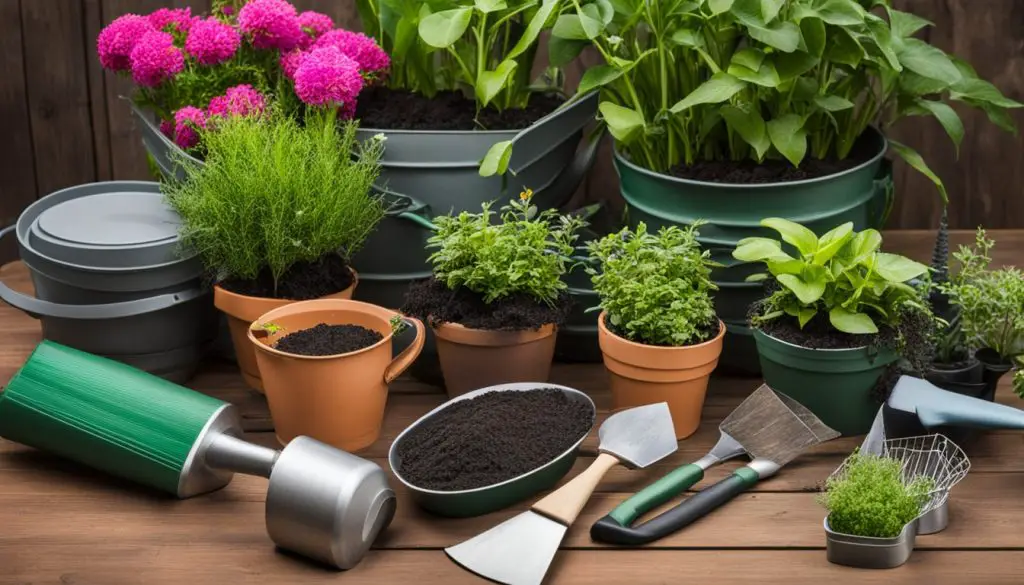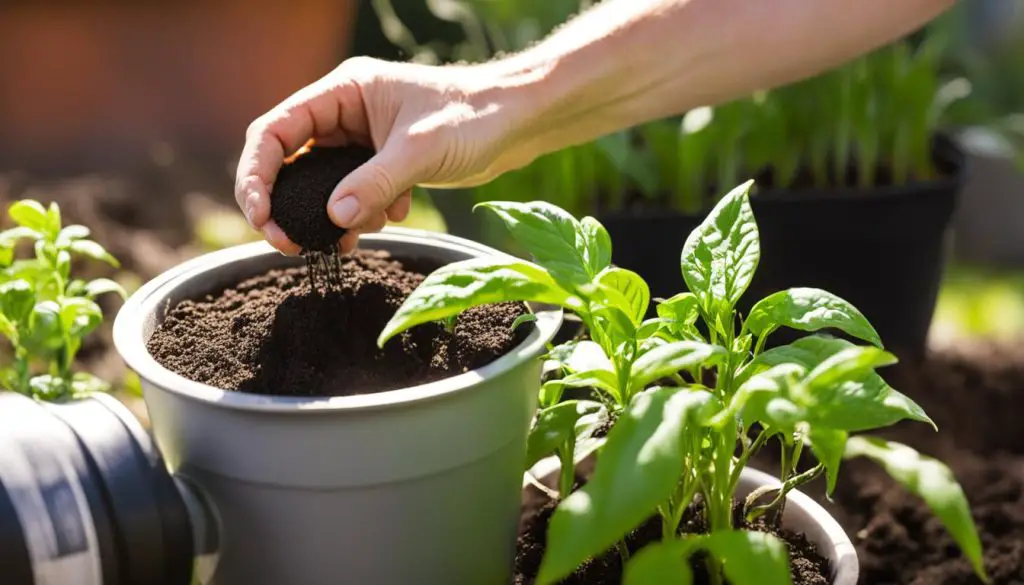Is it possible to create a thriving garden in the tight confines of an urban balcony or patio? Absolutely! Urban gardening allows city dwellers to transform small spaces into lush, productive areas where fresh greens and herbs can be easily grown.
Container gardening offers a versatile and economical approach to gardening, making it perfect for beginners and those with limited outdoor space. From using unconventional items like old buckets to start small and expand, this method provides an accessible way for anyone to enjoy home-grown freshness right from a window box or balcony arrangement.
Key Takeaways
- Convert your patio or balcony into a productive garden with urban gardening.
- Starting a container garden is perfect for small space gardening.
- Use various unconventional items as creative containers.
- Seed packets offer an economical starting point for an edible garden.
- Begin small and scale up over time based on your budget and space.
- Enjoy fresh greens and herbs with minimal outdoor space.
Choosing the Right Containers for Your Garden
Selecting the right container is crucial for the health and yield of your garden. With a variety of options available, it’s essential to understand the benefits and limitations of different container materials and designs to ensure your urban gardening success.
Container Materials
When considering container materials, it’s important to balance aesthetics and practicality:
- Terra cotta: While attractive, these pots can dry out quickly, requiring frequent watering.
- Plastic: These are economical and durable, an excellent choice for low-maintenance gardening.
- Wooden and raised beds: Combining beauty with functionality, these options add a rustic charm to your garden.
- Cement planters: Though a heftier investment, they are long-lasting and sturdy.
Size and Drainage
The appropriate container size and proper drainage for plants are vital for optimal growth. Different plants have varying needs:
- Container Size: Ensure the container is spacious enough for the plant’s root system. Smaller pots may suit herbs or lettuce, while larger ones are ideal for tomatoes or peppers.
- Drainage: This aspect is non-negotiable, as it prevents water logging and root rot, maintaining plant health. Ensure your containers have drainage holes or add a layer of gravel at the bottom.
Incorporating creative container ideas can also add personality to your garden while emphasizing functionality. For instance, repurposing items like old buckets or wicker baskets can showcase your creativity, making the gardening experience enjoyable and unique.
Essential Tools and Supplies for Container Gardening
Venturing into container gardening requires a handful of crucial tools and gardening supplies. The initial investment in these items guarantees a thriving garden that requires minimal maintenance and yields bountiful rewards.

Essential gardening supplies such as quality potting soil, efficient tools for gardening, and proper containers contribute significantly to the success of your urban garden.
A fruitful container garden begins with a good selection of tools for gardening. Quality potting soil is pivotal as it provides the necessary nutrients for plant health and growth. Additionally, having basic tools ensures ease in plant care. Below is a summary of the essentials you will need:
| Categories of Tools | Examples |
|---|---|
| Basic Tools | Trowel, Pruning Shears, Watering Can |
| Gardening Supplies | Potting Soil, Organic Fertilizers, Mulch |
| Containers | Terra Cotta Pots, Plastic Planters, Raised Beds |
For those interested in urban gardening essentials, investing in durable containers suited to the plants you choose is imperative. Items such as raised beds or terra cotta pots not only enhance the aesthetic value of your garden but also cater to the specific needs of various plants.
Incorporating low-maintenance gardening practices simplifies plant care, ensuring longevity and effective growth management. The initial effort and cost associated with these container gardening tips will undoubtedly pay off, providing you with a sustainable source of fresh produce and a beautiful garden oasis.
Investing in the right tools for gardening and gardening supplies forms the backbone of any successful container garden, transforming even the smallest urban spaces into lush, productive green zones.
Selecting Your Plants for the Container Garden
Choosing the right plants is paramount for a flourishing container garden. Whether you aim for ornamental beauty or an edible bounty, your selections will greatly affect the overall success and aesthetics of your space. From vibrant flowers to fresh, home-grown vegetables, the endless possibilities make this a rewarding experience for urban gardening enthusiasts.
Selecting the Perfect Plants
If you are trying to optimize your container garden, consider plants like basil, parsley, and cherry tomatoes. These are excellent for small space gardening due to their compact size and high yield. Strawberries can also be a delightful addition, offering both aesthetic and edible benefits. When you choose plants for container garden setups, always take into account their growth habits and spacing needs.
Understanding Sunlight and Temperature Needs
The success of your container garden largely hinges on understanding and meeting your plants’ sunlight exposure and plant temperature requirements. Plants like tomatoes and basil thrive in full sun, while greens like lettuce and parsley do well in partial shade. Assessing the sunlight patterns on your balcony or patio beforehand ensures that you place each plant where it can receive optimal light.
Container gardening offers flexibility as you can move the pots to adjust for better sunlight exposure, making it ideal for urban gardening. Moreover, be mindful of the temperature; some plants, such as tomatoes, need warmer climates, while others like leafy greens are more tolerant to cooler environments. Tailoring these elements to your plants’ specific needs will lead to a thriving and productive container garden.
Soil and Fertilization Tips for Healthy Plants
Creating a thriving container garden begins with selecting the right soil and fertilizing method. Both play critical roles in the health and productivity of your plants, from vibrant flowers to an abundant edible garden on your balcony.

Choosing Quality Potting Soil
The foundation of a successful container garden lies in using quality potting soil. Unlike garden soil, potting soil is specifically formulated to be lighter, ensuring proper drainage and aeration. For those aiming for urban gardening sustainability, organic potting soil is a wise choice. It provides essential nutrients that support the growth and development of nourishing container plants, paving the way for a flourishing garden.
Organic Fertilization Methods
Fertilization is another pivotal aspect of maintaining a lush container garden. Opting for organic fertilizers over chemical-laden alternatives allows you to control what is being introduced to your plants and ultimately, your food. These fertilizers slowly release nutrients, thereby continuously nourishing container plants throughout the growing season. This practice not only boosts growth but also aligns with urban gardening sustainability principles. By selecting the appropriate soil and fertilization methods, you ensure that your balcony garden nutrition needs are met, leading to a vibrant and productive garden space.
Watering Strategies for Container Gardens
Effective watering techniques are essential for any successful container garden. Since urban gardening often involves small spaces like patios or balconies, maintaining moisture levels in containers requires diligence. The soil in containers tends to dry out more quickly than ground soil, especially in warmer temperatures, making frequent watering necessary to ensure container garden hydration.
One practical method is to use the index finger test. By inserting your finger about an inch into the soil, you can gauge its moisture level and determine if it’s time to water. This simple yet effective technique helps avoid over-watering and ensures optimum moisture levels. Additionally, proper drainage is vital for the health of your container plants, allowing excess water to escape and preventing root rot.
To keep your small space gardening efforts thriving, consider creative watering solutions. Drip irrigation systems or self-watering containers can provide consistent hydration, reducing the manual effort involved in daily watering. For patio gardening water tips, watering early in the morning or late in the evening minimizes evaporation and ensures plants absorb water effectively.
- Utilize an index finger test for soil moisture
- Ensure proper drainage to avoid root issues
- Water early morning or late evening to reduce evaporation
- Explore drip irrigation or self-watering containers
By applying these watering techniques, urban gardeners can successfully maintain their container gardens, ensuring vibrant and healthy plants. Remember, each plant has unique water needs, so tailoring your approach based on individual requirements will lead to the best results in maintaining moisture levels.
Conclusion
Starting a container garden is an accessible and fulfilling way to introduce greenery into urban environments. This guide has delved into essential steps, ensuring beginner success with key practices like choosing the right containers, understanding plant needs, and investing in quality gardening supplies. These steps collectively facilitate urban gardening achievements, particularly for those with limited space.
The flexibility and lower maintenance associated with container gardening make it an ideal pursuit for both novice and seasoned gardeners. By focusing on essential details such as appropriate watering strategies and soil quality, you’ll be well-equipped to cultivate a personal edible garden, whether on a balcony, patio, or window box. This approach not only saves money on produce but enhances daily meals with fresh, home-grown ingredients.
Ultimately, container gardening succeeds in bringing nature closer to urban dwellers. The process is rewarding, offering both visual and nutritional benefits. This container gardening conclusion underscores the potential for balcony gardening success and the numerous beginner gardening rewards that come with nurturing your own plants, regardless of gardening expertise or living situation.
FAQ
How do I start a container garden as a beginner?
Starting a container garden is perfect for urban gardening and small spaces. Begin by selecting quality containers, potting soil, and essential tools. Choose plants that fit your space, such as herbs or compact vegetables, and position them where they can receive adequate sunlight.
What are the best types of containers for an urban garden?
Ideal container materials include terra cotta for aesthetics, plastic for durability, and wood for beauty. Ensure containers are the right size for your plants and have proper drainage to avoid water logging and root rot.
Which tools and supplies do I need for container gardening?
Essential tools for container gardening include trowels, watering cans, and pruning shears. Invest in quality potting soil with essential nutrients and choose containers designed for your plant choices, conducive to urban or patio gardening.
How do I choose the right plants for a small space garden?
Select plants that match your space constraints and sunlight exposure. Options like basil, parsley, cherry tomatoes, and strawberries are excellent for small spaces. Ensure you understand each plant’s sunlight and temperature needs for optimal growth.
What type of potting soil should I use?
Use quality potting soil, preferably organic, to provide essential nutrients. Organic potting soil is beneficial for growing edible plants and supports healthier, sustainable gardening practices.
How should I fertilize my container garden?
Opt for organic fertilizers, such as slow-release formulas, to nourish your container plants throughout the growing season. This method offers better control over the exposure to chemicals, especially important for edible gardens.
What are the best watering techniques for container gardens?
Water container gardens frequently, especially in warm weather, to maintain evenly moist soil. Use the index finger test to judge moisture levels and ensure proper drainage to prevent root rot.
Leave a Reply